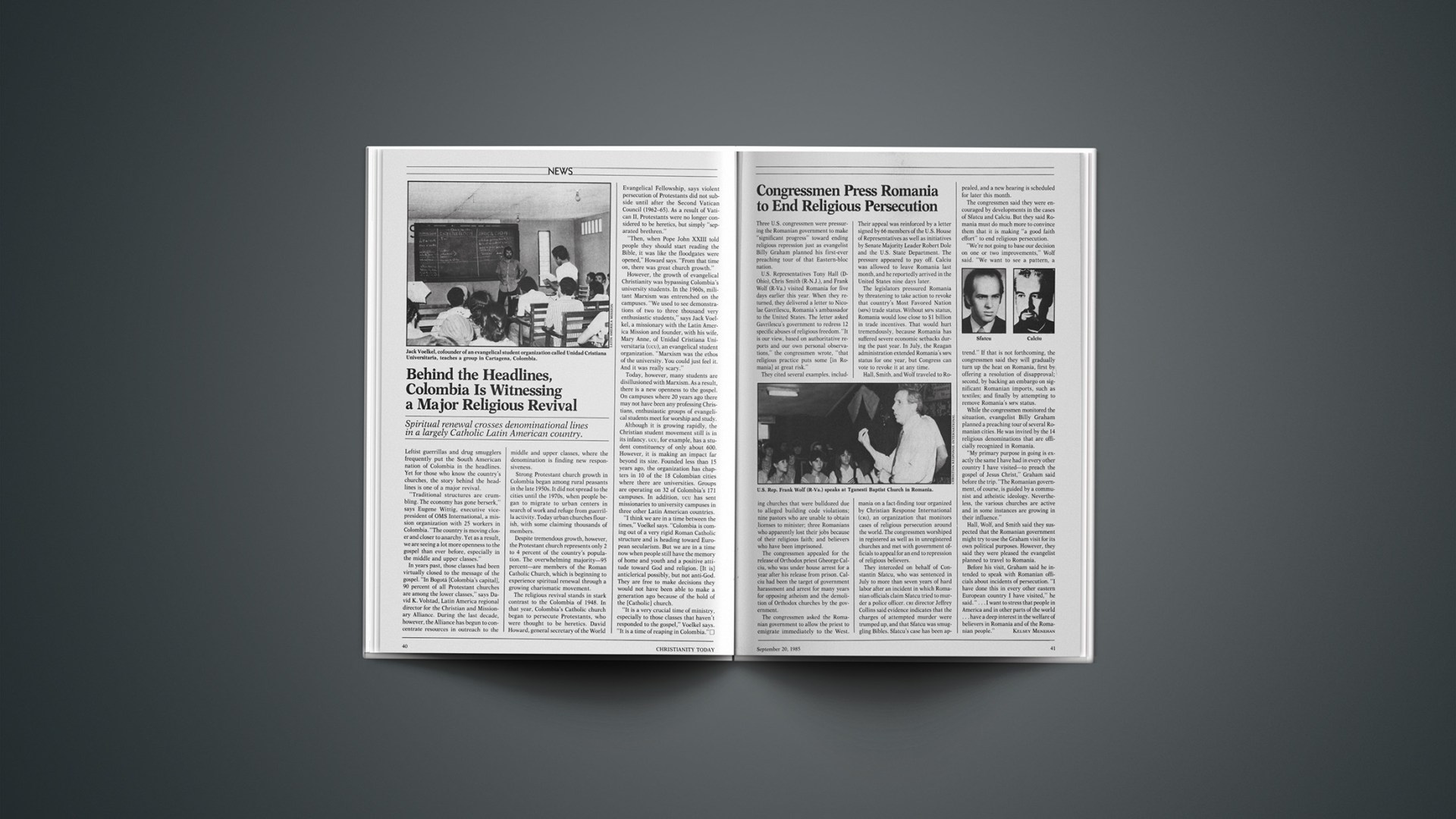Three U.S. congressmen were pressuring the Romanian government to make “significant progress” toward ending religious repression just as evangelist Billy Graham planned his first-ever preaching tour of that Eastern-bloc nation.
U.S. Representatives Tony Hall (D-Ohio), Chris Smith (R-N.J.), and Frank Wolf (R-Va.) visited Romania for five days earlier this year. When they returned, they delivered a letter to Nicolae Gavrilescu, Romania’s ambassador to the United States. The letter asked Gavrilescu’s government to redress 12 specific abuses of religious freedom. “It is our view, based on authoritative reports and our own personal observations,” the congressmen wrote, “that religious practice puts some [in Romania] at great risk.”
They cited several examples, including churches that were bulldozed due to alleged building code violations; nine pastors who are unable to obtain licenses to minister; three Romanians who apparently lost their jobs because of their religious faith; and believers who have been imprisoned.
The congressmen appealed for the release of Orthodox priest Gheorge Calciu, who was under house arrest for a year after his release from prison. Calciu had been the target of government harassment and arrest for many years for opposing atheism and the demolition of Orthodox churches by the government.
The congressmen asked the Romanian government to allow the priest to emigrate immediately to the West. Their appeal was reinforced by a letter signed by 66 members of the U.S. House of Representatives as well as initiatives by Senate Majority Leader Robert Dole and the U.S. State Department. The pressure appeared to pay off. Calciu was allowed to leave Romania last month, and he reportedly arrived in the United States nine days later.
The legislators pressured Romania by threatening to take action to revoke that country’s Most Favored Nation (MFN) trade status. Without MFN status, Romania would lose close to $1 billion in trade incentives. That would hurt tremendously, because Romania has suffered severe economic setbacks during the past year. In July, the Reagan administration extended Romania’s MFN status for one year, but Congress can vote to revoke it at any time.
Hall, Smith, and Wolf traveled to Romania on a fact-finding tour organized by Christian Response International (CRI), an organization that monitors cases of religious persecution around the world. The congressmen worshiped in registered as well as in unregistered churches and met with government officials to appeal for an end to repression of religious believers.
They interceded on behalf of Constantin Sfatcu, who was sentenced in July to more than seven years of hard labor after an incident in which Romanian officials claim Sfatcu tried to murder a police officer, CRI director Jeffrey Collins said evidence indicates that the charges of attempted murder were trumped up, and that Sfatcu was smuggling Bibles. Sfatcu’s case has been appealed, and a new hearing is scheduled for later this month.
The congressmen said they were encouraged by developments in the cases of Sfatcu and Calciu. But they said Romania must do much more to convince them that it is making “a good faith effort” to end religious persecution.
“We’re not going to base our decision on one or two improvements,” Wolf said. “We want to see a pattern, a trend.” If that is not forthcoming, the congressmen said they will gradually turn up the heat on Romania, first by offering a resolution of disapproval; second, by backing an embargo on significant Romanian imports, such as textiles; and finally by attempting to remove Romania’s MFN status.
While the congressmen monitored the situation, evangelist Billy Graham planned a preaching tour of several Romanian cities. He was invited by the 14 religious denominations that are officially recognized in Romania.
“My primary purpose in going is exactly the same I have had in every other country I have visited—to preach the gospel of Jesus Christ,” Graham said before the trip. “The Romanian government, of course, is guided by a communist and atheistic ideology. Nevertheless, the various churches are active and in some instances are growing in their influence.”
Hall, Wolf, and Smith said they suspected that the Romanian government might try to use the Graham visit for its own political purposes. However, they said they were pleased the evangelist planned to travel to Romania.
Before his visit, Graham said he intended to speak with Romanian officials about incidents of persecution. “I have done this in every other eastern European country I have visited,” he said. “… I want to stress that people in America and in other parts of the world … have a deep interest in the welfare of believers in Romania and of the Romanian people.”










